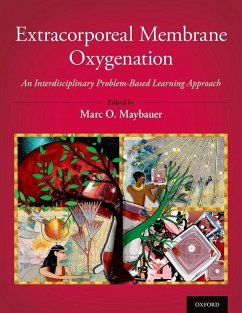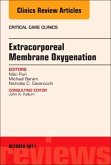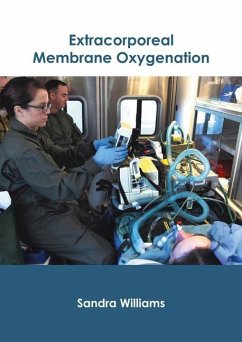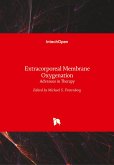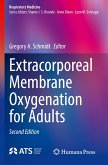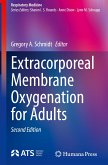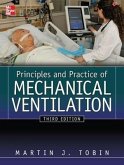Extracorporeal Membrane Oxygenation
An Interdisciplinary Problem-Based Learning Approach
Herausgeber: Maybauer, Marc O
Extracorporeal Membrane Oxygenation
An Interdisciplinary Problem-Based Learning Approach
Herausgeber: Maybauer, Marc O
- Gebundenes Buch
- Merkliste
- Auf die Merkliste
- Bewerten Bewerten
- Teilen
- Produkt teilen
- Produkterinnerung
- Produkterinnerung
"Extracorporeal Membrane Oxygenation : An Interdisciplinary Problem-Based Learning Approach" provides an overview of the latest techniques, management strategies, and technology surrounding the clinical use of ECMO. ECMO is a miniaturized heart-lung-machine that can be used to support patients with either acute respiratory and/or cardiocirculatory failure in numerous scenarios and can be a bridge to either heart or lung transplantation. This book focuses on educating clinicians about this complex but life-saving technology.
Andere Kunden interessierten sich auch für
![Extracorporeal Membrane Oxygenation (Ecmo), an Issue of Critical Care Clinics Extracorporeal Membrane Oxygenation (Ecmo), an Issue of Critical Care Clinics]() Nitin PuriExtracorporeal Membrane Oxygenation (Ecmo), an Issue of Critical Care Clinics58,99 €
Nitin PuriExtracorporeal Membrane Oxygenation (Ecmo), an Issue of Critical Care Clinics58,99 €![Extracorporeal Membrane Oxygenation Extracorporeal Membrane Oxygenation]() Extracorporeal Membrane Oxygenation131,99 €
Extracorporeal Membrane Oxygenation131,99 €![Extracorporeal Membrane Oxygenation Extracorporeal Membrane Oxygenation]() Extracorporeal Membrane Oxygenation101,99 €
Extracorporeal Membrane Oxygenation101,99 €![Evolving Therapies and Technologies in Extracorporeal Membrane Oxygenation Evolving Therapies and Technologies in Extracorporeal Membrane Oxygenation]() Evolving Therapies and Technologies in Extracorporeal Membrane Oxygenation135,00 €
Evolving Therapies and Technologies in Extracorporeal Membrane Oxygenation135,00 €![Extracorporeal Membrane Oxygenation for Adults Extracorporeal Membrane Oxygenation for Adults]() Extracorporeal Membrane Oxygenation for Adults75,99 €
Extracorporeal Membrane Oxygenation for Adults75,99 €![Extracorporeal Membrane Oxygenation for Adults Extracorporeal Membrane Oxygenation for Adults]() Extracorporeal Membrane Oxygenation for Adults105,99 €
Extracorporeal Membrane Oxygenation for Adults105,99 €![Principles and Practice of Mechanical Ventilation Principles and Practice of Mechanical Ventilation]() Martin J TobinPrinciples and Practice of Mechanical Ventilation348,99 €
Martin J TobinPrinciples and Practice of Mechanical Ventilation348,99 €-
-
-
"Extracorporeal Membrane Oxygenation : An Interdisciplinary Problem-Based Learning Approach" provides an overview of the latest techniques, management strategies, and technology surrounding the clinical use of ECMO. ECMO is a miniaturized heart-lung-machine that can be used to support patients with either acute respiratory and/or cardiocirculatory failure in numerous scenarios and can be a bridge to either heart or lung transplantation. This book focuses on educating clinicians about this complex but life-saving technology.
Produktdetails
- Produktdetails
- Verlag: Hurst & Co.
- Seitenzahl: 688
- Erscheinungstermin: 22. März 2022
- Englisch
- Abmessung: 287mm x 229mm x 35mm
- Gewicht: 2170g
- ISBN-13: 9780197521304
- ISBN-10: 0197521304
- Artikelnr.: 63628065
- Herstellerkennzeichnung
- Libri GmbH
- Europaallee 1
- 36244 Bad Hersfeld
- gpsr@libri.de
- Verlag: Hurst & Co.
- Seitenzahl: 688
- Erscheinungstermin: 22. März 2022
- Englisch
- Abmessung: 287mm x 229mm x 35mm
- Gewicht: 2170g
- ISBN-13: 9780197521304
- ISBN-10: 0197521304
- Artikelnr.: 63628065
- Herstellerkennzeichnung
- Libri GmbH
- Europaallee 1
- 36244 Bad Hersfeld
- gpsr@libri.de
Marc Oliver Maybauer, MD, PhD, Professor of Anesthesiology and Critical Care Medicine, Philipps University, Marburg, Germany; HonoraryProfessor of Anesthesiology and Critical Care Medicine, University of Queensland, Brisbane, Australia; Adjunct Clinical Professor of Medicine / Cardiology, Oklahoma State University Health Science Center, Tulsa, OK, USA and Integris Baptist Medical Center, Nazih Zuhdi Transplant Institute, Advanced Critical Care and Acute Mechanical Circulatory Support, Oklahoma City, OK, USA Consultant, Director of ECMO and Lead for Research, Cardiothoracic Anaesthesia and Critical Care, Manchester Royal Infirmary, Manchester, United Kingdom
* HISTORY OF ECMO
* 1 From the first ECMO patient into the future
* TECHNICAL AND PROGRAMMATIC ASPECTS OF ECMO
* 2 Development and staffing of an ECMO service
* 3 ECMO configurations and cannulation in pediatric patients
* 4 ECMO configurations and cannulation in adult patients
* 5 The ECMO circuit and trouble shooting
* 6 Echocardiography in the management of ECMO patients
* 7 Airway management in ECMO patients
* 8 Acute renal failure and renal replacement therapy in ECMO patients
* 9 Ambulance ground transportation of ECMO patients
* 10 Fixed-wing and helicopter air transport of ECMO patients
* 11 Implications and experiences with long run ECMO
* ECMO BLOOD INTERACTION
* 12 The unholy blood - biomaterial interaction in extracorporeal
* 13 Heparin anticoagulation for Trans-catheter Aortic Valve
Implantation on ECMO
* 14 Bivalirudin for alternative anticoagulation in heparin induced
thrombocytopenia during ECMO
* 15 Argatroban for anticoagulation in pediatric and adult ECMO
* 16 ECMO transfusion and coagulation management
* PHARMACOLOGICAL CONSIDERATIONS FOR ECMO
* 17 Pharmacological considerations for analgesia and sedation of ECMO
* 18 Challenges of antimicrobial therapy in ECMO patients
* 19 Vasopressor and inotropic support in ECMO patients with refractory
shock
* ECMO IN NEONATAL AND PEDIATRIC RESPIRATORY DISEASE
* 20 ECMO for Meconium Aspiration Syndrome
* 21 ECMO for neonatal pulmonary hypertension and associated
* 22 ECMO in Congenital Diaphragmatic Hernia
* 23 Evidence and management of rare presentations in neonatal ECMO
* 24 ECMO for the pediatric patient with Status Asthmaticus
* 25 ECMO for pediatric pneumonia and sepsis
* 26 ECMO in pediatric lung transplantation
* 27 Weaning and decannulation of neonatal and pediatric respiratory
ECMO support
* ECMO IN NEONATAL AND PEDIATRIC CARDIAC DISEASE
* 28 ECMO in pediatric patients with univentricular circulation
* 29 ECMO in pediatric patients with congenital heart disease
* 30 Extracorporeal cardiopulmonary resuscitation in children
* 31 ECMO as a bridge to pediatric heart transplantation
* 32 Weaning and decannulation of pediatric cardiac ECMO
* ECMO IN ADULT RESPIRATORY DISEASE
* 33 Veno-venous ECMO for Acute Respiratory Distress Syndrome
* 34 Extracorporeal CO2 removal to enhance protective ventilation in
ARDS
* 35 ECMO in Middle Eastern Respiratory Syndrome (MERS-CoV)
* 36 ECMO in SARS-CoV-2 (COVID-19) patients
* 37 ECMO in pregnancy and the peripartum patient
* 38 ECMO in sickle cell disease and acute chest syndrome
* 39 ECMO for severe respiratory failure secondary to HIV infection
* 40 Bicaval dual lumen ECMO cannulation for lung transplantation
* 41 Weaning and liberation from V-V ECMO
* ECMO IN ADULT CARDIAC DISEASE
* 42 ECMO support for adults with congenital heart disease
* 43 ECMO for myocardial infarction with cardiogenic shock
* 44 ECMO support for patients with myocarditis
* 45 Left ventricular venting strategies during ECMO support
* 46 ECMO support for patients with major aortic surgery or dissection
* 47 Mechanical support for post-cardiotomy right ventricular failure
* 48 ECMO for the complicated post-cardiotomy cardiac arrest
* 49 ECMO for accidental hypothermia and cardiorespiratory arrest
* 50 ECMO support for pulmonary embolism
* 51 Extracorporeal cardiopulmonary resuscitation in adults
* 52 Bridging from ECMO to durable left ventricular assist device
* 53 ECMO in the management of heart transplantation
* 54 Weaning and liberation from V-A ECMO
* ECMO IN THE ADULT TRAUMA PATIENT
* 55 ECMO for hemorrhagic shock after blunt trauma
* 56 ECMO in patients with burn and smoke inhalation injury
* REHABILITATION, NEUROLOGICAL AND ETHICAL ASPECTS OF ECMO
* 57 ECMO in the awake patient, early extubation and physical
rehabilitation
* 58 Neurodevelopmental outcome after pediatric cardiac ECMO support
* 59 Neurologic complications in adult ECMO
* 60 Management of ECMO complicated by intracranial hemorrhage
* 61 Neurological monitoring and determination of brain death in ECMO
* 62 Ethical considerations for ECMO initiation and end-of-life care
* 1 From the first ECMO patient into the future
* TECHNICAL AND PROGRAMMATIC ASPECTS OF ECMO
* 2 Development and staffing of an ECMO service
* 3 ECMO configurations and cannulation in pediatric patients
* 4 ECMO configurations and cannulation in adult patients
* 5 The ECMO circuit and trouble shooting
* 6 Echocardiography in the management of ECMO patients
* 7 Airway management in ECMO patients
* 8 Acute renal failure and renal replacement therapy in ECMO patients
* 9 Ambulance ground transportation of ECMO patients
* 10 Fixed-wing and helicopter air transport of ECMO patients
* 11 Implications and experiences with long run ECMO
* ECMO BLOOD INTERACTION
* 12 The unholy blood - biomaterial interaction in extracorporeal
* 13 Heparin anticoagulation for Trans-catheter Aortic Valve
Implantation on ECMO
* 14 Bivalirudin for alternative anticoagulation in heparin induced
thrombocytopenia during ECMO
* 15 Argatroban for anticoagulation in pediatric and adult ECMO
* 16 ECMO transfusion and coagulation management
* PHARMACOLOGICAL CONSIDERATIONS FOR ECMO
* 17 Pharmacological considerations for analgesia and sedation of ECMO
* 18 Challenges of antimicrobial therapy in ECMO patients
* 19 Vasopressor and inotropic support in ECMO patients with refractory
shock
* ECMO IN NEONATAL AND PEDIATRIC RESPIRATORY DISEASE
* 20 ECMO for Meconium Aspiration Syndrome
* 21 ECMO for neonatal pulmonary hypertension and associated
* 22 ECMO in Congenital Diaphragmatic Hernia
* 23 Evidence and management of rare presentations in neonatal ECMO
* 24 ECMO for the pediatric patient with Status Asthmaticus
* 25 ECMO for pediatric pneumonia and sepsis
* 26 ECMO in pediatric lung transplantation
* 27 Weaning and decannulation of neonatal and pediatric respiratory
ECMO support
* ECMO IN NEONATAL AND PEDIATRIC CARDIAC DISEASE
* 28 ECMO in pediatric patients with univentricular circulation
* 29 ECMO in pediatric patients with congenital heart disease
* 30 Extracorporeal cardiopulmonary resuscitation in children
* 31 ECMO as a bridge to pediatric heart transplantation
* 32 Weaning and decannulation of pediatric cardiac ECMO
* ECMO IN ADULT RESPIRATORY DISEASE
* 33 Veno-venous ECMO for Acute Respiratory Distress Syndrome
* 34 Extracorporeal CO2 removal to enhance protective ventilation in
ARDS
* 35 ECMO in Middle Eastern Respiratory Syndrome (MERS-CoV)
* 36 ECMO in SARS-CoV-2 (COVID-19) patients
* 37 ECMO in pregnancy and the peripartum patient
* 38 ECMO in sickle cell disease and acute chest syndrome
* 39 ECMO for severe respiratory failure secondary to HIV infection
* 40 Bicaval dual lumen ECMO cannulation for lung transplantation
* 41 Weaning and liberation from V-V ECMO
* ECMO IN ADULT CARDIAC DISEASE
* 42 ECMO support for adults with congenital heart disease
* 43 ECMO for myocardial infarction with cardiogenic shock
* 44 ECMO support for patients with myocarditis
* 45 Left ventricular venting strategies during ECMO support
* 46 ECMO support for patients with major aortic surgery or dissection
* 47 Mechanical support for post-cardiotomy right ventricular failure
* 48 ECMO for the complicated post-cardiotomy cardiac arrest
* 49 ECMO for accidental hypothermia and cardiorespiratory arrest
* 50 ECMO support for pulmonary embolism
* 51 Extracorporeal cardiopulmonary resuscitation in adults
* 52 Bridging from ECMO to durable left ventricular assist device
* 53 ECMO in the management of heart transplantation
* 54 Weaning and liberation from V-A ECMO
* ECMO IN THE ADULT TRAUMA PATIENT
* 55 ECMO for hemorrhagic shock after blunt trauma
* 56 ECMO in patients with burn and smoke inhalation injury
* REHABILITATION, NEUROLOGICAL AND ETHICAL ASPECTS OF ECMO
* 57 ECMO in the awake patient, early extubation and physical
rehabilitation
* 58 Neurodevelopmental outcome after pediatric cardiac ECMO support
* 59 Neurologic complications in adult ECMO
* 60 Management of ECMO complicated by intracranial hemorrhage
* 61 Neurological monitoring and determination of brain death in ECMO
* 62 Ethical considerations for ECMO initiation and end-of-life care
* HISTORY OF ECMO
* 1 From the first ECMO patient into the future
* TECHNICAL AND PROGRAMMATIC ASPECTS OF ECMO
* 2 Development and staffing of an ECMO service
* 3 ECMO configurations and cannulation in pediatric patients
* 4 ECMO configurations and cannulation in adult patients
* 5 The ECMO circuit and trouble shooting
* 6 Echocardiography in the management of ECMO patients
* 7 Airway management in ECMO patients
* 8 Acute renal failure and renal replacement therapy in ECMO patients
* 9 Ambulance ground transportation of ECMO patients
* 10 Fixed-wing and helicopter air transport of ECMO patients
* 11 Implications and experiences with long run ECMO
* ECMO BLOOD INTERACTION
* 12 The unholy blood - biomaterial interaction in extracorporeal
* 13 Heparin anticoagulation for Trans-catheter Aortic Valve
Implantation on ECMO
* 14 Bivalirudin for alternative anticoagulation in heparin induced
thrombocytopenia during ECMO
* 15 Argatroban for anticoagulation in pediatric and adult ECMO
* 16 ECMO transfusion and coagulation management
* PHARMACOLOGICAL CONSIDERATIONS FOR ECMO
* 17 Pharmacological considerations for analgesia and sedation of ECMO
* 18 Challenges of antimicrobial therapy in ECMO patients
* 19 Vasopressor and inotropic support in ECMO patients with refractory
shock
* ECMO IN NEONATAL AND PEDIATRIC RESPIRATORY DISEASE
* 20 ECMO for Meconium Aspiration Syndrome
* 21 ECMO for neonatal pulmonary hypertension and associated
* 22 ECMO in Congenital Diaphragmatic Hernia
* 23 Evidence and management of rare presentations in neonatal ECMO
* 24 ECMO for the pediatric patient with Status Asthmaticus
* 25 ECMO for pediatric pneumonia and sepsis
* 26 ECMO in pediatric lung transplantation
* 27 Weaning and decannulation of neonatal and pediatric respiratory
ECMO support
* ECMO IN NEONATAL AND PEDIATRIC CARDIAC DISEASE
* 28 ECMO in pediatric patients with univentricular circulation
* 29 ECMO in pediatric patients with congenital heart disease
* 30 Extracorporeal cardiopulmonary resuscitation in children
* 31 ECMO as a bridge to pediatric heart transplantation
* 32 Weaning and decannulation of pediatric cardiac ECMO
* ECMO IN ADULT RESPIRATORY DISEASE
* 33 Veno-venous ECMO for Acute Respiratory Distress Syndrome
* 34 Extracorporeal CO2 removal to enhance protective ventilation in
ARDS
* 35 ECMO in Middle Eastern Respiratory Syndrome (MERS-CoV)
* 36 ECMO in SARS-CoV-2 (COVID-19) patients
* 37 ECMO in pregnancy and the peripartum patient
* 38 ECMO in sickle cell disease and acute chest syndrome
* 39 ECMO for severe respiratory failure secondary to HIV infection
* 40 Bicaval dual lumen ECMO cannulation for lung transplantation
* 41 Weaning and liberation from V-V ECMO
* ECMO IN ADULT CARDIAC DISEASE
* 42 ECMO support for adults with congenital heart disease
* 43 ECMO for myocardial infarction with cardiogenic shock
* 44 ECMO support for patients with myocarditis
* 45 Left ventricular venting strategies during ECMO support
* 46 ECMO support for patients with major aortic surgery or dissection
* 47 Mechanical support for post-cardiotomy right ventricular failure
* 48 ECMO for the complicated post-cardiotomy cardiac arrest
* 49 ECMO for accidental hypothermia and cardiorespiratory arrest
* 50 ECMO support for pulmonary embolism
* 51 Extracorporeal cardiopulmonary resuscitation in adults
* 52 Bridging from ECMO to durable left ventricular assist device
* 53 ECMO in the management of heart transplantation
* 54 Weaning and liberation from V-A ECMO
* ECMO IN THE ADULT TRAUMA PATIENT
* 55 ECMO for hemorrhagic shock after blunt trauma
* 56 ECMO in patients with burn and smoke inhalation injury
* REHABILITATION, NEUROLOGICAL AND ETHICAL ASPECTS OF ECMO
* 57 ECMO in the awake patient, early extubation and physical
rehabilitation
* 58 Neurodevelopmental outcome after pediatric cardiac ECMO support
* 59 Neurologic complications in adult ECMO
* 60 Management of ECMO complicated by intracranial hemorrhage
* 61 Neurological monitoring and determination of brain death in ECMO
* 62 Ethical considerations for ECMO initiation and end-of-life care
* 1 From the first ECMO patient into the future
* TECHNICAL AND PROGRAMMATIC ASPECTS OF ECMO
* 2 Development and staffing of an ECMO service
* 3 ECMO configurations and cannulation in pediatric patients
* 4 ECMO configurations and cannulation in adult patients
* 5 The ECMO circuit and trouble shooting
* 6 Echocardiography in the management of ECMO patients
* 7 Airway management in ECMO patients
* 8 Acute renal failure and renal replacement therapy in ECMO patients
* 9 Ambulance ground transportation of ECMO patients
* 10 Fixed-wing and helicopter air transport of ECMO patients
* 11 Implications and experiences with long run ECMO
* ECMO BLOOD INTERACTION
* 12 The unholy blood - biomaterial interaction in extracorporeal
* 13 Heparin anticoagulation for Trans-catheter Aortic Valve
Implantation on ECMO
* 14 Bivalirudin for alternative anticoagulation in heparin induced
thrombocytopenia during ECMO
* 15 Argatroban for anticoagulation in pediatric and adult ECMO
* 16 ECMO transfusion and coagulation management
* PHARMACOLOGICAL CONSIDERATIONS FOR ECMO
* 17 Pharmacological considerations for analgesia and sedation of ECMO
* 18 Challenges of antimicrobial therapy in ECMO patients
* 19 Vasopressor and inotropic support in ECMO patients with refractory
shock
* ECMO IN NEONATAL AND PEDIATRIC RESPIRATORY DISEASE
* 20 ECMO for Meconium Aspiration Syndrome
* 21 ECMO for neonatal pulmonary hypertension and associated
* 22 ECMO in Congenital Diaphragmatic Hernia
* 23 Evidence and management of rare presentations in neonatal ECMO
* 24 ECMO for the pediatric patient with Status Asthmaticus
* 25 ECMO for pediatric pneumonia and sepsis
* 26 ECMO in pediatric lung transplantation
* 27 Weaning and decannulation of neonatal and pediatric respiratory
ECMO support
* ECMO IN NEONATAL AND PEDIATRIC CARDIAC DISEASE
* 28 ECMO in pediatric patients with univentricular circulation
* 29 ECMO in pediatric patients with congenital heart disease
* 30 Extracorporeal cardiopulmonary resuscitation in children
* 31 ECMO as a bridge to pediatric heart transplantation
* 32 Weaning and decannulation of pediatric cardiac ECMO
* ECMO IN ADULT RESPIRATORY DISEASE
* 33 Veno-venous ECMO for Acute Respiratory Distress Syndrome
* 34 Extracorporeal CO2 removal to enhance protective ventilation in
ARDS
* 35 ECMO in Middle Eastern Respiratory Syndrome (MERS-CoV)
* 36 ECMO in SARS-CoV-2 (COVID-19) patients
* 37 ECMO in pregnancy and the peripartum patient
* 38 ECMO in sickle cell disease and acute chest syndrome
* 39 ECMO for severe respiratory failure secondary to HIV infection
* 40 Bicaval dual lumen ECMO cannulation for lung transplantation
* 41 Weaning and liberation from V-V ECMO
* ECMO IN ADULT CARDIAC DISEASE
* 42 ECMO support for adults with congenital heart disease
* 43 ECMO for myocardial infarction with cardiogenic shock
* 44 ECMO support for patients with myocarditis
* 45 Left ventricular venting strategies during ECMO support
* 46 ECMO support for patients with major aortic surgery or dissection
* 47 Mechanical support for post-cardiotomy right ventricular failure
* 48 ECMO for the complicated post-cardiotomy cardiac arrest
* 49 ECMO for accidental hypothermia and cardiorespiratory arrest
* 50 ECMO support for pulmonary embolism
* 51 Extracorporeal cardiopulmonary resuscitation in adults
* 52 Bridging from ECMO to durable left ventricular assist device
* 53 ECMO in the management of heart transplantation
* 54 Weaning and liberation from V-A ECMO
* ECMO IN THE ADULT TRAUMA PATIENT
* 55 ECMO for hemorrhagic shock after blunt trauma
* 56 ECMO in patients with burn and smoke inhalation injury
* REHABILITATION, NEUROLOGICAL AND ETHICAL ASPECTS OF ECMO
* 57 ECMO in the awake patient, early extubation and physical
rehabilitation
* 58 Neurodevelopmental outcome after pediatric cardiac ECMO support
* 59 Neurologic complications in adult ECMO
* 60 Management of ECMO complicated by intracranial hemorrhage
* 61 Neurological monitoring and determination of brain death in ECMO
* 62 Ethical considerations for ECMO initiation and end-of-life care

